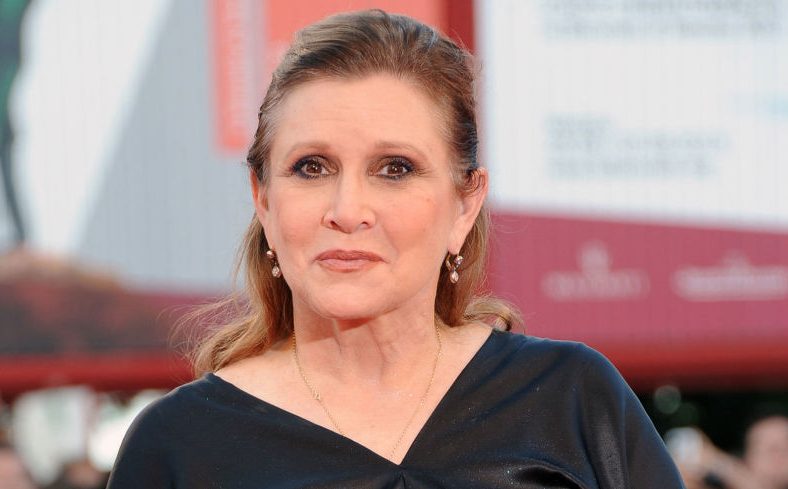
Image credit: Getty
ON DECEMBER 27, 2016, Carrie Fisher passed away, four days after a massive heart attack and more than 40 years after she first began making us smile, laugh, and cry, as a singer, actor, comedian, and writer. In the wake of her passing, hundreds of her fellow writers made sure to mark her passing as she wanted it remembered, reporting that she died, “drowned in moonlight, strangled by her own bra.” Her passing left so many of us without words that this bit of silly journalism was the best way we could articulate our feelings: Here you go, Carrie. I hope it means as much to you as you’ve meant to us.
In her most iconic role, Carrie Fisher was my hero. I didn’t want to be Princess Leia, really; I wanted to be Han Solo. But who saves Han Solo’s ass in Return of the Jedi? Leia f*cking Organa, disguised as a bounty hunter named Boushh. I idolized the cocky bastard of questionable morals, but Princess Leia’s loveable assholishness was the first crack in the glass ceiling of my internalized misogyny — the proof that women could save men.
Ultimately, each of us will remember Carrie Fisher in our own way, whether that’s as Princess Leia — General Leia, for the younger generations — or as the writer behind Postcards from the Edge, as the one-woman show that is Wishful Drinking, the script doctor who helped made The Blues Brothers and Hook so fantastic, or as the mental health advocate who spoke openly and honestly about her vices. One song remains the same, however: we remember her as an absolute badass.
Carrie Fisher never really wanted to be in show business. Some of her earliest memories involve the unfair treatment Hollywood bestows upon its one-time stars. Her mother, Debbie Reynolds, had burst onto the screen in Singin’ in the Rain, flanked by Gene Kelly and Donald O’Connor, but the roles available to her slowly diminished over time, as age pushed her out for younger actresses.
Fisher was 20 years old when she was cast as Princess Leia, the age when you know you can be anything, but that didn’t shelter her from Hollywood expectations. The 110-lb. actress was asked to lose 10 pounds for the role, but didn’t — not because of any feminist body positivity, but because fat farms suck and no one noticed that she hadn’t taken off the weight. The stipulation that she lose weight for this or that role followed her until the end of her career, but an older, wiser Fisher wasn’t afraid to call Hollywood on its bullshit. As she told Stephen Colbert: “They always [ask me to lose weight]. They want to hire part of me, not all of me. They want to hire about three-fourths, so I have to get rid of the fourth somehow. The fourth can’t be with me.”
Sometime over the next decade, after years of substance abuse, Fisher accidentally overdosed, and was subsequently diagnosed with bipolar disorder. It took a while for that to sink in. She told Diane Sawyer in 2000 that she thought the doctors had given her the diagnosis “to make [her] feel better about being a drug addict.”
Regardless of her initial reactions to the news, Fisher wore her diagnosis on her sleeve. According to Quartz, she celebrated her release from rehab by throwing a party “featuring a rented ambulance and a cardboard cut-out of Princess Leia strapped to a gurney with an IV in her arm.” After using electroconvulsive therapy (ECT) — more commonly known as electroshock therapy — Fisher spoke out about its benefit to her, dispelling myths along the way, telling Rolling Stone that “it’s not used as punishment by nurses in a mental hospital when you’re bad.” Although she had very little to lose from her openness and honesty, having come from Hollywood royalty and being affluent enough to survive without actively working, Fisher’s attitude toward having a mental illness made a world of difference for fans with related diagnoses.
Similarly, Fisher’s outspokenness about her dysfunctional family life made things just a little bit easier for people growing up in less-than-ideal homes. She always asked permission to tell-all before telling all in one of her memoirs, and she was frank about the shortcomings of both of her parents. Her father, Eddie Fisher, involved his young family in a scandal when he left Reynolds and their two children to marry the recently widowed Elizabeth Taylor. Consequently, he was absent for much of Fisher’s childhood and adolescence, leaving her in the care of Reynolds: an unconventional, if beloved, parent who bought her 15-year-old daughter a vibrator for Christmas and offered to observe and give pointers, if and when she wanted to have sex.
Fisher overcame Hollywood, the big-bunned shadow of Princess Leia, mental illness, substance addiction, and a questionable upbringing to become the person she wanted to be. For that, we can all take a few pages out of her book of badassery.
















